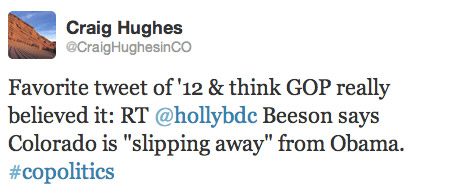Scott Tipton: Still All Over The Map on “Spending”
Excerpted from Rep. Scott Tipton’s newsletter to constituents yesterday:
House Republicans remain insistent on budget cuts before looking to increase taxes, while Obama is calling for an extension of the current tax structure for all but the nation’s highest earners, households with more than $250,000 in income and individuals with more than $200,000. Those taxpayers would see their marginal income tax rates increase from 35 percent to 39.6 percent, as well as see increased rates on capital gains and inheritance taxes. U.S. Rep. Scott Tipton, R-Colo., wants to know where and how additional revenue from higher taxation would be spent, and how it would reduce spending, his office said…
It seems obvious to us that asking how “additional revenue” will “reduce spending” is kind of oxymoronic, but it at least re-emphasizes the point that Tipton is against spending.
Sort of, based on the very next point in his newsletter:
U.S. Rep. Scott Tipton, R-Colo., asked federal agricultural officials Monday to ease restrictive insurance guidelines on farmers in the San Luis Valley given the lingering drought. Tipton expressed his concern in a letter to USDA’s Risk Management Agency, stating that agency guidelines would limit farmers in the Multiple Peril Crop Insurance Program from filing claims because of less water being available.
We did some checking on this: for fiscal year 2004, for which we found a report, the Federal Crop Insurance Corporation collected $928 million in premiums, subsidized (meaning taxpayers covered) $2 billion in premiums, and incurred $3.2 billion in losses. The program’s total budget in FY 2004 was $3.4 billion. Here’s a little more historical detail from the Journal of Agricultural and Resource Economics:
Government outlays for the federal crop insurance program exceeded $9.2 billion between 1980 and 1990. Over this period, indemnity outlays totaled over $7.1 billion while premiums collected from producers were only $3.8 billion. This corresponds to net losses (excluding administrative costs) that exceed $3.3 billion and implies that, on average, farmers received $1.88 in indemnities for each $1 of premiums paid (i.e., a loss ratio of 1.88).
It’s not like we’re going to deny relief to San Luis Valley farmers, but isn’t somebody going to ask how easing payouts from already generous farm subsidy “insurance” will “cut spending?” This is a lot like Tipton’s praise for the new solar power plant in Alamosa funded by the same loan guarantee program that funded Solyndra, a company Tipton routinely vilifies.
And why doesn’t Tipton feel as strongly about your grandmother’s health care, again? It would be one thing if Tipton was consistent about “cutting spending,” something only a few members of the “Tea Party” class of 2010 can say they have been. Tipton’s problem is not wrongheaded principle, but a sense that there’s no principle at work at all.


 This irrational radicalization of the grassroots right wing
This irrational radicalization of the grassroots right wing 